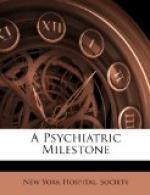At the other extremity of the hierarchical series of tendencies the acts are simply reflex. When the disease descends to this level, when the elementary acts can no longer be executed correctly, we do not hesitate either, and we consider these disorders (related with known lesions) as organic diseases of the nervous system. But between these two terms we note disorders in behavior which are more difficult to interpret. These disorders are too grave and too difficult to modify by our usual processes of education and punishment for us to consider them as mere errors or as moral faults; they are variable; they are not accompanied by actually visible lesions and we have trouble in classing them among the acknowledged deteriorations of the organism. There is the province of neuroses and psychoses, intermedium between that of rational errors and that of organic diseases of the nervous system. It corresponds to the disorders of medium psychological functions, to the group of these operations which establish a union more or less solid between the language and the movements of limbs and which give birth to our wills and beliefs.
Can one establish, in this group, a distinction between neuroses and psychoses that rests on some more precise notion and that is not limited to distinguishing them in a legal point of view? A more profound knowledge of the mechanisms of the will and belief would perhaps permit us to do so. We are capable of wills and beliefs of a superior order when we reach decision after reflection. The operation of reflection which hinders tendencies and maintains them in the shape of ideas, which compares ideas and which only decides after this deliberation, constitutes the highest form of the medium operations of the human mind. Lower, still, there exists will and belief, but they are formed without reflection, without stoppage of ideas, without deliberation; they are the result of an immediate assent which transforms verbal formulas into wills and beliefs as soon as they strike the attention, as soon as they are accompanied by a powerful sentiment. The immediate assent is the inferior form of these tendencies.




